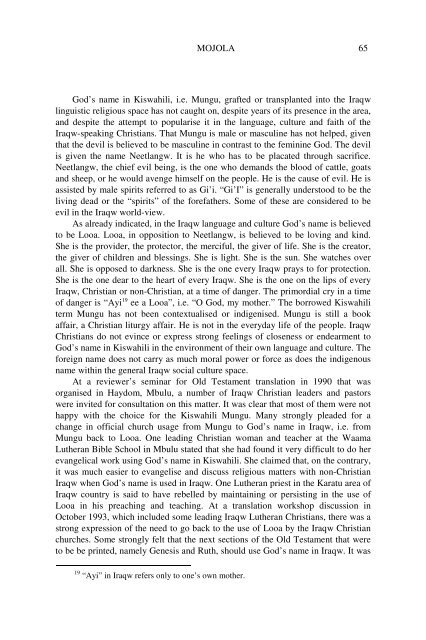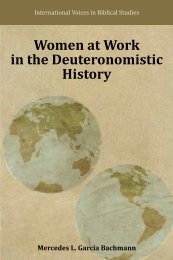Global Hermeneutics? - International Voices in Biblical Studies ...
Global Hermeneutics? - International Voices in Biblical Studies ...
Global Hermeneutics? - International Voices in Biblical Studies ...
Create successful ePaper yourself
Turn your PDF publications into a flip-book with our unique Google optimized e-Paper software.
MOJOLA 65<br />
God’s name <strong>in</strong> Kiswahili, i.e. Mungu, grafted or transplanted <strong>in</strong>to the Iraqw<br />
l<strong>in</strong>guistic religious space has not caught on, despite years of its presence <strong>in</strong> the area,<br />
and despite the attempt to popularise it <strong>in</strong> the language, culture and faith of the<br />
Iraqw-speak<strong>in</strong>g Christians. That Mungu is male or mascul<strong>in</strong>e has not helped, given<br />
that the devil is believed to be mascul<strong>in</strong>e <strong>in</strong> contrast to the fem<strong>in</strong><strong>in</strong>e God. The devil<br />
is given the name Neetlangw. It is he who has to be placated through sacrifice.<br />
Neetlangw, the chief evil be<strong>in</strong>g, is the one who demands the blood of cattle, goats<br />
and sheep, or he would avenge himself on the people. He is the cause of evil. He is<br />
assisted by male spirits referred to as Gi’i. “Gi’I” is generally understood to be the<br />
liv<strong>in</strong>g dead or the “spirits” of the forefathers. Some of these are considered to be<br />
evil <strong>in</strong> the Iraqw world-view.<br />
As already <strong>in</strong>dicated, <strong>in</strong> the Iraqw language and culture God’s name is believed<br />
to be Looa. Looa, <strong>in</strong> opposition to Neetlangw, is believed to be lov<strong>in</strong>g and k<strong>in</strong>d.<br />
She is the provider, the protector, the merciful, the giver of life. She is the creator,<br />
the giver of children and bless<strong>in</strong>gs. She is light. She is the sun. She watches over<br />
all. She is opposed to darkness. She is the one every Iraqw prays to for protection.<br />
She is the one dear to the heart of every Iraqw. She is the one on the lips of every<br />
Iraqw, Christian or non-Christian, at a time of danger. The primordial cry <strong>in</strong> a time<br />
of danger is “Ayi 19 ee a Looa”, i.e. “O God, my mother.” The borrowed Kiswahili<br />
term Mungu has not been contextualised or <strong>in</strong>digenised. Mungu is still a book<br />
affair, a Christian liturgy affair. He is not <strong>in</strong> the everyday life of the people. Iraqw<br />
Christians do not ev<strong>in</strong>ce or express strong feel<strong>in</strong>gs of closeness or endearment to<br />
God’s name <strong>in</strong> Kiswahili <strong>in</strong> the environment of their own language and culture. The<br />
foreign name does not carry as much moral power or force as does the <strong>in</strong>digenous<br />
name with<strong>in</strong> the general Iraqw social culture space.<br />
At a reviewer’s sem<strong>in</strong>ar for Old Testament translation <strong>in</strong> 1990 that was<br />
organised <strong>in</strong> Haydom, Mbulu, a number of Iraqw Christian leaders and pastors<br />
were <strong>in</strong>vited for consultation on this matter. It was clear that most of them were not<br />
happy with the choice for the Kiswahili Mungu. Many strongly pleaded for a<br />
change <strong>in</strong> official church usage from Mungu to God’s name <strong>in</strong> Iraqw, i.e. from<br />
Mungu back to Looa. One lead<strong>in</strong>g Christian woman and teacher at the Waama<br />
Lutheran Bible School <strong>in</strong> Mbulu stated that she had found it very difficult to do her<br />
evangelical work us<strong>in</strong>g God’s name <strong>in</strong> Kiswahili. She claimed that, on the contrary,<br />
it was much easier to evangelise and discuss religious matters with non-Christian<br />
Iraqw when God’s name is used <strong>in</strong> Iraqw. One Lutheran priest <strong>in</strong> the Karatu area of<br />
Iraqw country is said to have rebelled by ma<strong>in</strong>ta<strong>in</strong><strong>in</strong>g or persist<strong>in</strong>g <strong>in</strong> the use of<br />
Looa <strong>in</strong> his preach<strong>in</strong>g and teach<strong>in</strong>g. At a translation workshop discussion <strong>in</strong><br />
October 1993, which <strong>in</strong>cluded some lead<strong>in</strong>g Iraqw Lutheran Christians, there was a<br />
strong expression of the need to go back to the use of Looa by the Iraqw Christian<br />
churches. Some strongly felt that the next sections of the Old Testament that were<br />
to be be pr<strong>in</strong>ted, namely Genesis and Ruth, should use God’s name <strong>in</strong> Iraqw. It was<br />
19 “Ayi” <strong>in</strong> Iraqw refers only to one’s own mother.




